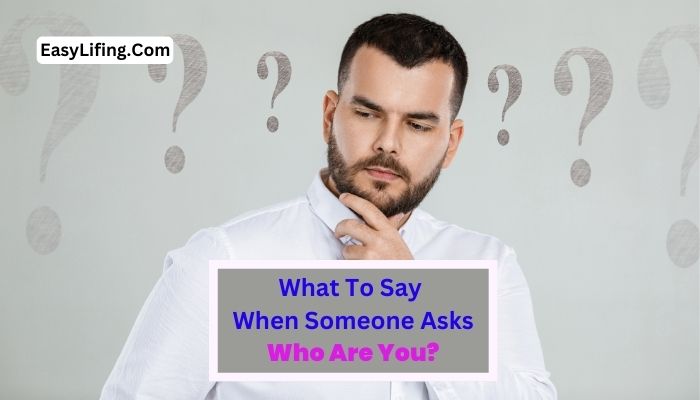What To Say When Someone Asks Who Are You?
Knowing how to introduce yourself in a clear and concise way is an essential skill for both personal and professional situations. But what if the question makes you feel uncomfortable or defensive? What if you’re unsure what the person means by “Who are you?” And how do you respond to “Who are you?” text messages in a way that conveys your identity and tone? Here I will answer everything.
So, what to say when someone asks, who are you? In most scenarios, you can just introduce yourself with your name.
For a professional approach, you can say, like- “I’m [Your Name], an entrepreneur and a software engineer.”
If you want to be more creative, you could say something like, “I’m the person who [insert something unique or interesting about yourself]”.
For example, “I’m the person who loves to explore new places and cultures.” It depends on the situation.
How To Introduce Yourself in A Clear and Concise Way?
It can be difficult to introduce yourself in a clear and straightforward manner, but with a little preparation, it can become a breeze. The following advice will help you write a clear and succinct introduction:
- Start with your name: Begin your introduction by stating your name clearly. This not only gives the other person an idea of who you are but also helps them remember your name.
- Provide context: Give a brief context about yourself, such as your profession, your role in the organization, or what brings you to the event. This helps the other person to quickly understand who you are and what you do.
- Highlight your key attributes: Mention a few key attributes that you possess, such as your skills, interests, or personal values. This helps to create a positive impression and gives the other person an idea of what you’re all about.
- Keep it brief: Aim to keep your introduction brief and to the point. Avoid going into too much detail or rambling on, as this can bore the other person.
Example of a Simple and Effective Introduction
“Hi, my name is Sarah. I’m a marketing manager at XYZ Corporation. I’m passionate about using creativity to solve business problems, and I love working with people who share this passion. Nice to meet you!”
This introduction is clear and concise, providing the other person with your name, your profession, and a key attribute that highlights your passion for creativity. It’s also friendly and inviting, which can help to put the other person at ease.
Tips to Remember
- When crafting your introduction, it’s important to tailor it to the context and audience.
- For example, if you’re at a networking event, you may want to focus on your professional attributes, whereas if you’re at a social gathering, you may want to highlight your personal interests.
These pointers can help you introduce yourself in a way that makes a good first impression.
What To Do If the Question Makes You Feel Uncomfortable or Defensive?
It’s not uncommon for the question “Who are you?” to trigger discomfort or defensiveness, especially if it’s asked in a confrontational or judgmental tone. Understanding why the question might trigger these feelings can help you to handle the situation more gracefully.
One reason why the question might trigger discomfort is that it can feel like an invasion of privacy. We’re often taught not to share personal information with strangers, so being asked to divulge information about ourselves can feel uncomfortable.
Additionally, the question can sometimes be perceived as a challenge to our identity or authority, which can lead to defensiveness.
If you find yourself feeling uncomfortable or defensive when asked “Who are you?”, here are some strategies for handling the situation gracefully:
- Take a breath: Before responding, take a deep breath and remind yourself that the other person is likely just trying to make conversation.
- Clarify the question: If you’re unsure what the person means by “Who are you?”, politely ask for clarification. This can help you to tailor your response to the situation.
- Keep it light: If the question is asked in a social setting, try to keep your response light and friendly. You can share a few key attributes about yourself without divulging too much personal information.
- Redirect the conversation: If you’re uncomfortable sharing personal information, try redirecting the conversation to a topic that you feel more comfortable discussing.
As an example, you might say something like, “I’m not comfortable sharing personal information with strangers, but I’m happy to chat about the weather or the latest movies.”
By following these strategies, you can handle the situation with grace and ease, without feeling uncomfortable or defensive. Remember, it’s okay to set boundaries and prioritize your own comfort in social situations.
What To Do If You’re Unsure What the Person Means By “Who Are You?”
If you’re unsure what the person means by “Who are you?”, it’s important to seek clarification in a way that doesn’t come across as rude or defensive. Asking clarifying questions can help you to understand the other person’s intent and tailor your response accordingly.
Here are some strategies for seeking clarification:
- Stay calm: Before responding, take a moment to breathe and compose yourself. If you’re feeling defensive or uneasy, it can be easy to come across as confrontational.
- Ask open-ended questions: Rather than assuming that you know what the other person means by “Who are you?”, ask open-ended questions to gather more information. You might say something like, “Can you clarify what you mean by that?” or “What specifically would you like to know about me?”
- Reflect on the context: Think about the context in which the question was asked. Are you in a job interview or a social setting? This can give you clues as to what the other person might be looking for in your response.
- Tailor your response: Based on the information you’ve gathered, tailor your response accordingly. If you’re in a job interview, for example, you might focus on your relevant skills and experience. If you’re in a social setting, you might share a few key attributes about yourself.
Here are some examples of clarifying questions you could ask:
“Can you tell me a bit more about what you’re looking for?”
“What specifically would you like to know about me?”
“Could you clarify what you mean by ‘Who are you?'”
“Are you asking about my personal background or my professional experience?”
By seeking clarification in a calm and respectful way, you can ensure that you’re providing the other person with the information they’re looking for, without feeling confused or defensive.
How to Respond to Who Are You Text?
With the increasing use of technology, it’s not uncommon to receive a “Who are you?” text message from someone you’ve just met or don’t know very well. Crafting a response that conveys your identity and tone can be challenging, but there are some tips that can help you navigate the situation.
Tips For Crafting A Response
- Keep it concise: Text messages are meant to be brief, so keep your response short and to the point.
- Be clear: Clearly state your name and any relevant information about yourself. If you’re responding to a professional contact, include your job title and company name.
- Show your personality: While it’s important to be professional and respectful, you can also show some personality in your response. This can help to create a connection with the other person.
- Consider the context: Think about the context in which the message was sent. Are you responding to a potential employer or a new acquaintance? This can help you tailor your response accordingly.
Here are some sample responses for different scenarios:
How To Respond To Who Are You Text From A Girl?
“Hi there! This is Hridoy. We met at the WordPress event last week. How are you doing?”
Best reply for Who are you to a boy
“Hey! It’s Trisha. We met at a bookshop a few days ago. How’s it going?”
When it’s not a professional approach and you are trying to make someone’s mood better you might be searching by writing “Who are you reply answer funny” Here are the sentences you can use :
- “I am a secret agent, and I can’t reveal my true identity.”
- “I am a ninja, and I operate in the shadows.”
- “I am a unicorn, and I bring magic wherever I go.”
While these responses may not be appropriate for all situations, they can be a fun and lighthearted way to break the ice and show your personality.
Short Description About Yourself Sample
Now let’s make it easier for you. As I already mentioned earlier, it’s important to have a brief and concise description that captures your key attributes while introducing yourself. Let’s have some examples of short descriptions about yourself that you can use in different contexts:
- Professional setting: “Hi, my name is John and I’m a marketing executive with 10 years of experience. I specialize in creating digital marketing campaigns that drive customer engagement and sales.”
- Networking event: “Hello, I’m Jane, and I’m a freelance graphic designer. I have a passion for creating visually stunning designs that communicate a brand’s message effectively.”
- Social setting: “Hey, I’m Alex and I’m an adventure enthusiast. I love exploring new places, trying new food, and meeting new people. I’m also an avid runner and enjoy staying active.”
When crafting your short description, consider highlighting your strengths and passions that align with the context of the situation. Here are some tips for customizing your description to different contexts:
- Think about the purpose of the introduction and what information would be most relevant to the person or group you’re introducing yourself to.
- Use positive and confident language to convey your personality and expertise.
- Be concise and avoid overwhelming the listener with unnecessary details.
- Practice your introduction beforehand to ensure it flows smoothly and sounds natural.
By having a short and effective description of yourself, you can make a great first impression and leave a lasting impression on the people you meet.
Read Also
What To Say To Someone Who Is Self-Loathing?
What To Say To An Inconsistent Guy?
Conclusion
Introducing yourself can be a daunting task, especially if you’re put on the spot. However, with these tips and examples, you’ll be able to confidently and effectively introduce yourself in a variety of situations.
Remember to keep your introduction clear, concise, and tailored to the context. If you feel uncomfortable or uncertain, don’t be afraid to seek clarification or redirect the conversation.
With practice, you’ll be able to master the art of introducing yourself and making a positive impression on those around you.
Don’t forget to connect with us on our social media platforms for more helpful tips and articles. Follow us on Facebook, Twitter, and Pinterest for daily updates and engaging content that will help you navigate the world with confidence. Thank you for reading, and we hope this article has been helpful to you.







